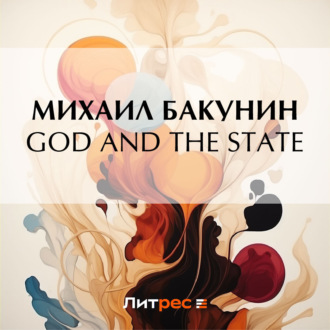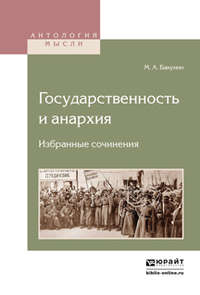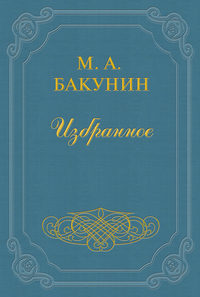 полная версия
полная версияGod and the State
The great misfortune is that a large number of natural laws, already established as such by science, remain unknown to the masses, thanks to the watchfulness of these tutelary governments that exist, as we know, only for the good of the people. There is another difficulty – namely, that the major portion of the natural laws connected with the development of human society, which are quite as necessary, invariable, fatal, as the laws that govern the physical world, have not been duly established and recognized by science itself.
Once they shall have been recognized by science, and then from science, by means of an extensive system of popular education and instruction, shall have passed into the consciousness of all, the question of liberty will be entirely solved. The most stubborn authorities must admit that then there will be no need either of political organization or direction or legislation, three things which, whether they emanate from the will of the sovereign or from the vote of a parliament elected by universal suffrage, and even should they conform to the system of natural laws – which has never been the case and never will be the case – are always equally fatal and hostile to the liberty of the masses from the very fact that they impose upon them a system of external and therefore despotic laws.
The liberty of man consists solely in this: that he obeys natural laws because he has himself recognized them as such, and not because they have been externally imposed upon him by any extrinsic will whatever, divine or human, collective or individual.
Suppose a learned academy, composed of the most illustrious representatives of science; suppose this academy charged with legislation for and the organization of society, and that, inspired only by the purest love of truth, it frames none but laws in absolute harmony with the latest discoveries of science. Well, I maintain, for my part, that such legislation and such organization would be a monstrosity, and that for two reasons: first, that human science is always and necessarily imperfect, and that, comparing what it has discovered with what remains to be discovered, we may say that it is still in its cradle. So that were we to try to force the practical life of men, collective as well as individual, into strict and exclusive conformity with the latest data of science, we should condemn society as well as individuals to suffer martyrdom on a bed of Procrustes, which would soon end by dislocating and stifling them, life ever remaining an infinitely greater thing than science.
The second reason is this: a society which should obey legislation emanating from a scientific academy, not because it understood itself the rational character of this legislation (in which case the existence of the academy would become useless), but because this legislation, emanating from the academy, was imposed in the name of a science which it venerated without comprehending – such a society would be a society, not of men, but of brutes. It would be a second edition of those missions in Paraguay which submitted so long to the government of the Jesuits. It would surely and rapidly descend to the lowest stage of idiocy.
But there is still a third reason which would render such a government impossible – namely that a scientific academy invested with a sovereignty, so to speak, absolute, even if it were composed of the most illustrious men, would infallibly and soon end in its own moral and intellectual corruption. Even to-day, with the few privileges allowed them, such is the history of all academies. The greatest scientific genius, from the moment that he becomes an academician, an officially licensed savant, inevitably lapses into sluggishness. He loses his spontaneity, his revolutionary hardihood, and that troublesome and savage energy characteristic of the grandest geniuses, ever called to destroy old tottering worlds and lay the foundations of new. He undoubtedly gains in politeness, in utilitarian and practical wisdom, what he loses in power of thought. In a word, he becomes corrupted.
It is the characteristic of privilege and of every privileged position to kill the mind and heart of men. The privileged man, whether politically or economically, is a man depraved in mind and heart. That is a social law which admits of no exception, and is as applicable to entire nations as to classes, corporations, and individuals. It is the law of equality, the supreme condition of liberty and humanity. The principal object of this treatise is precisely to demonstrate this truth in all the manifestations of human life.
A scientific body to which had been confided the government of society would soon end by devoting itself no longer to science at all, but to quite another affair; and that affair, as in the case of all established powers, would be its own eternal perpetuation by rendering the society confided to its care ever more stupid and consequently more in need of its government and direction.
But that which is true of scientific academies is also true of all constituent and legislative assemblies, even those chosen by universal suffrage. In the latter case they may renew their composition, it is true, but this does not prevent the formation in a few years’ time of a body of politicians, privileged in fact though not in law, who, devoting themselves exclusively to the direction of the public affairs of a country, finally form a sort of political aristocracy or oligarchy. Witness the United States of America and Switzerland.
Consequently, no external legislation and no authority – one, for that matter, being inseparable from the other, and both tending to the servitude of society and the degradation of the legislators themselves.
Does it follow that I reject all authority? Far from me such a thought. In the matter of boots, I refer to the authority of the bootmaker; concerning houses, canals, or railroads, I consult that of the architect or engineer. For such or such special knowledge I apply to such or such a savant. But I allow neither the bootmaker nor the architect nor the savant to impose his authority upon me. I listen to them freely and with all the respect merited by their intelligence, their character, their knowledge, reserving always my incontestable right of criticism and censure. I do not content myself with consulting a single authority in any special branch; I consult several; I compare their opinions, and choose that which seems to me the soundest. But I recognize no infallible authority, even in special questions; consequently, whatever respect I may have for the honesty and the sincerity of such or such an individual, I have no absolute faith in any person. Such a faith would be fatal to my reason, to my liberty, and even to the success of my undertakings; it would immediately transform me into a stupid slave, an instrument of the will and interests of others.
If I bow before the authority of the specialists and avow my readiness to follow, to a certain extent and as long as may seem to me necessary, their indications and even their directions, it is because their authority is imposed upon me by no one, neither by men nor by God. Otherwise I would repel them with horror, and bid the devil take their counsels, their directions, and their services, certain that they would make me pay, by the loss of my liberty and self-respect, for such scraps of truth, wrapped in a multitude of lies, as they might give me.
I bow before the authority of special men because it is imposed upon me by my own reason. I am conscious of my inability to grasp, in all its details and positive developments, any very large portion of human knowledge. The greatest intelligence would not be equal to a comprehension of the whole. Thence results, for science as well as for industry, the necessity of the division and association of labor. I receive and I give – such is human life. Each directs and is directed in his turn. Therefore there is no fixed and constant authority, but a continual exchange of mutual, temporary, and, above all, voluntary authority and subordination.
This same reason forbids me, then, to recognize a fixed, constant, and universal authority, because there is no universal man, no man capable of grasping in that wealth of detail, without which the application of science to life is impossible, all the sciences, all the branches of social life. And if such universality could ever be realized in a single man, and if he wished to take advantage thereof to impose his authority upon us, it would be necessary to drive this man out of society, because his authority would inevitably reduce all the others to slavery and imbecility. I do not think that society ought to maltreat men of genius as it has done hitherto; but neither do I think it should indulge them too far, still less accord them any privileges or exclusive rights whatsoever; and that for three reasons: first, because it would often mistake a charlatan for a man of genius; second, because, through such a system of privileges, it might transform into a charlatan even a real man of genius, demoralize him, and degrade him; and, finally, because it would establish a master over itself.
To sum up. We recognize, then, the absolute authority of science, because the sole object of science is the mental reproduction, as well-considered and systematic as possible, of the natural laws inherent in the material, intellectual, and moral life of both the physical and the social worlds, these two worlds constituting, in fact, but one and the same natural world. Outside of this only legitimate authority, legitimate because rational and in harmony with human liberty, we declare all other authorities false, arbitrary and fatal.
We recognize the absolute authority of science, but we reject the infallibility and universality of the savant. In our church – if I may be permitted to use for a moment an expression which I so detest: Church and State are my two bêtes noires– in our church, as in the Protestant church, we have a chief, an invisible Christ, science; and, like the Protestants, more logical even than the Protestants, we will suffer neither pope, nor council, nor conclaves of infallible cardinals, nor bishops, nor even priests. Our Christ differs from the Protestant and Christian Christ in this – that the latter is a personal being, ours impersonal; the Christian Christ, already completed in an eternal past, presents himself as a perfect being, while the completion and perfection of our Christ, science, are ever in the future: which is equivalent to saying that they will never be realized. Therefore, in recognizing absolute science as the only absolute authority, we in no way compromise our liberty.
I mean by the words “absolute science,” the truly universal science which would reproduce ideally, to its fullest extent and in all its infinite detail, the universe, the system or co-ordination of all the natural laws manifested by the incessant development of the world. It is evident that such a science, the sublime object of all the efforts of the human mind, will never be fully and absolutely realized. Our Christ, then, will remain eternally unfinished, which must considerably take down the pride of his licensed representatives among us. Against that God the Son in whose name they assume to impose upon us their insolent and pedantic authority, we appeal to God the Father, who is the real world, real life, of which he (the Son) is only a too imperfect expression, whilst we real beings, living, working, struggling, loving, aspiring, enjoying, and suffering, are its immediate representatives.
But, while rejecting the absolute, universal, and infallible authority of men of science, we willingly bow before the respectable, although relative, quite temporary, and very restricted authority of the representatives of special sciences, asking nothing better than to consult them by turns, and very grateful for such precious information as they may extend to us, on condition of their willingness to receive from us on occasions when, and concerning matters about which, we are more learned than they. In general, we ask nothing better than to see men endowed with great knowledge, great experience, great minds, and, above all, great hearts, exercise over us a natural and legitimate influence, freely accepted, and never imposed in the name of any official authority whatsoever, celestial or terrestrial. We accept all natural authorities and all influences of fact, but none of right; for every authority or every influence of right, officially imposed as such, becoming directly an oppression and a falsehood, would inevitably impose upon us, as I believe I have sufficiently shown, slavery and absurdity.
In a word, we reject all legislation, all authority, and all privileged, licensed, official, and legal influence, even though arising from universal suffrage, convinced that it can turn only to the advantage of a dominant minority of exploiters against the interests of the immense majority in subjection to them.
This is the sense in which we are really Anarchists.
The modern idealists understand authority in quite a different way. Although free from the traditional superstitions of all the existing positive religions, they nevertheless attach to this idea of authority a divine, an absolute meaning. This authority is not that of a truth miraculously revealed, nor that of a truth rigorously and scientifically demonstrated. They base it to a slight extent upon quasi-philosophical reasoning, and to a large extent on vaguely religious faith, to a large extent also on sentiment, ideally, abstractly poetical. Their religion is, as it were, a last attempt to divinize all that constitutes humanity in men.
This is just the opposite of the work that we are doing. In behalf of human liberty, dignity, and prosperity, we believe it our duty to recover from heaven the goods which it has stolen and return them to earth. They, on the contrary, endeavoring to commit a final religiously heroic larceny, would restore to heaven, that divine robber, finally unmasked, the grandest, finest, and noblest of humanity’s possessions. It is now the freethinkers’ turn to pillage heaven by their audacious impiety and scientific analysis.
The idealists undoubtedly believe that human ideas and deeds, in order to exercise greater authority among men, must be invested with a divine sanction. How is this sanction manifested? Not by a miracle, as in the positive religions, but by the very grandeur or sanctity of the ideas and deeds: whatever is grand, whatever is beautiful, whatever is noble, whatever is just, is considered divine. In this new religious cult every man inspired by these ideas, by these deeds, becomes a priest, directly consecrated by God himself. And the proof? He needs none beyond the very grandeur of the ideas which he expresses and the deeds which he performs. These are so holy that they can have been inspired only by God.
Such, in few words, is their whole philosophy: a philosophy of sentiments, not of real thoughts, a sort of metaphysical pietism. This seems harmless, but it is not so at all, and the very precise, very narrow, and very barren doctrine hidden under the intangible vagueness of these poetic forms leads to the same disastrous results that all the positive religions lead to – namely, the most complete negation of human liberty and dignity.
To proclaim as divine all that is grand, just, noble, and beautiful in humanity is to tacitly admit that humanity of itself would have been unable to produce it – that is, that, abandoned to itself, its own nature is miserable, iniquitous, base, and ugly. Thus we come back to the essence of all religion – in other words, to the disparagement of humanity for the greater glory of divinity. And from the moment that the natural inferiority of man and his fundamental incapacity to rise by his own effort, unaided by any divine inspiration, to the comprehension of just and true ideas, are admitted, it becomes necessary to admit also all the theological, political, and social consequences of the positive religions. From the moment that God, the perfect and supreme being, is posited face to face with humanity, divine mediators, the elect, the inspired of God spring from the earth to enlighten, direct, and govern in his name the human race.
May we not suppose that all men are equally inspired by God? Then, surely, there is no further use for mediators. But this supposition is impossible, because it is too clearly contradicted by the facts. It would compel us to attribute to divine inspiration all the absurdities and errors which appear, and all the horrors, follies, base deeds, and cowardly actions which are committed, in the world. But perhaps, then, only a few men are divinely inspired, the great men of history, the virtuous geniuses, as the illustrious Italian citizen and prophet, Giuseppe Mazzini, called them. Immediately inspired by God himself and supported upon universal consent expressed by popular suffrage —Dio e Popolo– such as these should be called to the government of human societies.3
But here we are again fallen back under the yoke of Church and State. It is true that in this new organization, indebted for its existence, like all the old political organizations, to the grace of God, but supported this time – at least so far as form is concerned, as a necessary concession to the spirit of modern times, and just as in the preambles of the imperial decrees of Napoleon III. – on the (pretended) will of the people, the Church will no longer call itself Church; it will call itself School. What matters it? On the benches of this School will be seated not children only; there will be found the eternal minor, the pupil confessedly forever incompetent to pass his examinations, rise to the knowledge of his teachers, and dispense with their discipline – the people.4 The State will no longer call itself Monarchy; it will call itself Republic: but it will be none the less the State – that is, a tutelage officially and regularly established by a minority of competent men, men of virtuous genius or talent, who will watch and guide the conduct of this great, incorrigible, and terrible child, the people. The professors of the School and the functionaries of the State will call themselves republicans; but they will be none the less tutors, shepherds, and the people will remain what they have been hitherto from all eternity, a flock. Beware of shearers, for where there is a flock there necessarily must be shepherds also to shear and devour it.
The people, in this system, will be the perpetual scholar and pupil. In spite of its sovereignty, wholly fictitious, it will continue to serve as the instrument of thoughts, wills, and consequently interests not its own. Between this situation and what we call liberty, the only real liberty, there is an abyss. It will be the old oppression and old slavery under new forms; and where there is slavery there is misery, brutishness, real social materialism, among the privileged classes as well as among the masses.
In deifying human things the idealists always end in the triumph of a brutal materialism. And this for a very simple reason: the divine evaporates and rises to its own country, heaven, while the brutal alone remains actually on earth.
Yes, the necessary consequence of theoretical idealism is practically the most brutal materialism; not, undoubtedly, among those who sincerely preach it – the usual result as far as they are concerned being that they are constrained to see all their efforts struck with sterility – but among those who try to realize their precepts in life, and in all society so far as it allows itself to be dominated by idealistic doctrines.
To demonstrate this general fact, which may appear strange at first, but which explains itself naturally enough upon further reflection, historical proofs are not lacking.
Compare the last two civilizations of the ancient world – the Greek and the Roman. Which is the most materialistic, the most natural, in its point of departure, and the most humanly ideal in its results? Undoubtedly the Greek civilization. Which on the contrary, is the most abstractly ideal in its point of departure – sacrificing the material liberty of the man to the ideal liberty of the citizen, represented by the abstraction of judicial law, and the natural development of human society to the abstraction of the State – and which became nevertheless the most brutal in its consequences? The Roman civilization, certainly. It is true that the Greek civilization, like all the ancient civilizations, including that of Rome, was exclusively national and based on slavery. But, in spite of these two immense defects, the former none the less conceived and realized the idea of humanity; it ennobled and really idealized the life of men; it transformed human herds into free associations of free men; it created through liberty the sciences, the arts, a poetry, an immortal philosophy, and the primary concepts of human respect. With political and social liberty, it created free thought. At the close of the Middle Ages, during the period of the Renaissance, the fact that some Greek emigrants brought a few of those immortal books into Italy sufficed to resuscitate life, liberty, thought, humanity, buried in the dark dungeon of Catholicism. Human emancipation, that is the name of the Greek civilization. And the name of the Roman civilization? Conquest, with all its brutal consequences. And its last word? The omnipotence of the Cæsars. Which means the degradation and enslavement of nations and of men.
To-day even, what is it that kills, what is it that crushes brutally, materially, in all European countries, liberty and humanity? It is the triumph of the Cæsarian or Roman principle.
Compare now two modern civilizations – the Italian and the German. The first undoubtedly represents, in its general character, materialism; the second, on the contrary, represents idealism in its most abstract, most pure, and most transcendental form. Let us see what are the practical fruits of the one and the other.
Italy has already rendered immense services to the cause of human emancipation. She was the first to resuscitate and widely apply the principle of liberty in Europe, and to restore to humanity its titles to nobility: industry, commerce, poetry, the arts, the positive sciences, and free thought. Crushed since by three centuries of imperial and papal despotism, and dragged in the mud by her governing bourgeoisie, she reappears to-day, it is true, in a very degraded condition in comparison with what she once was. And yet how much she differs from Germany! In Italy, in spite of this decline – temporary let us hope – one may live and breathe humanly, surrounded by a people which seems to be born for liberty. Italy, even bourgeois Italy, can point with pride to men like Mazzini and Garibaldi. In Germany one breathes the atmosphere of an immense political and social slavery, philosophically explained and accepted by a great people with deliberate resignation and free will. Her heroes – I speak always of present Germany, not of the Germany of the future; of aristocratic, bureaucratic, political and bourgeoise Germany, not of the Germany of the prolétaires– her heroes are quite the opposite of Mazzini and Garibaldi: they are William I., that ferocious and ingenuous representative of the Protestant God, Messrs. Bismarck and Moltke, Generals Manteuffel and Werder. In all her international relations Germany, from the beginning of her existence, has been slowly, systematically invading, conquering, ever ready to extend her own voluntary enslavement into the territory of her neighbors; and, since her definitive establishment as a unitary power, she has become a menace, a danger to the liberty of entire Europe. To-day Germany is servility brutal and triumphant.
To show how theoretical idealism incessantly and inevitably changes into practical materialism, one needs only to cite the example of all the Christian Churches, and, naturally, first of all, that of the Apostolic and Roman Church. What is there more sublime, in the ideal sense, more disinterested, more separate from all the interests of this earth, than the doctrine of Christ preached by that Church? And what is there more brutally materialistic than the constant practice of that same Church since the eighth century, from which dates her definitive establishment as a power? What has been and still is the principal object of all her contests with the sovereigns of Europe? Her temporal goods, her revenues first, and then her temporal power, her political privileges. We must do her the justice to acknowledge that she was the first to discover, in modern history, this incontestable but scarcely Christian truth that wealth and power, the economic exploitation and the political oppression of the masses, are the two inseparable terms of the reign of divine ideality on earth: wealth consolidating and augmenting power, power ever discovering and creating new sources of wealth, and both assuring, better than the martyrdom and faith of the apostles, better than divine grace, the success of the Christian propagandism. This is a historical truth, and the Protestant Churches do not fail to recognize it either. I speak, of course, of the independent churches of England, America, and Switzerland, not of the subjected churches of Germany. The latter have no initiative of their own; they do what their masters, their temporal sovereigns, who are at the same time their spiritual chieftains, order them to do. It is well known that the Protestant propagandism, especially in England and America, is very intimately connected with the propagandism of the material, commercial interests of those two great nations; and it is known also that the objects of the latter propagandism is not at all the enrichment and material prosperity of the countries into which it penetrates in company with the Word of God, but rather the exploitation of those countries with a view to the enrichment and material prosperity of certain classes, which in their own country are very covetous and very pious at the same time.









